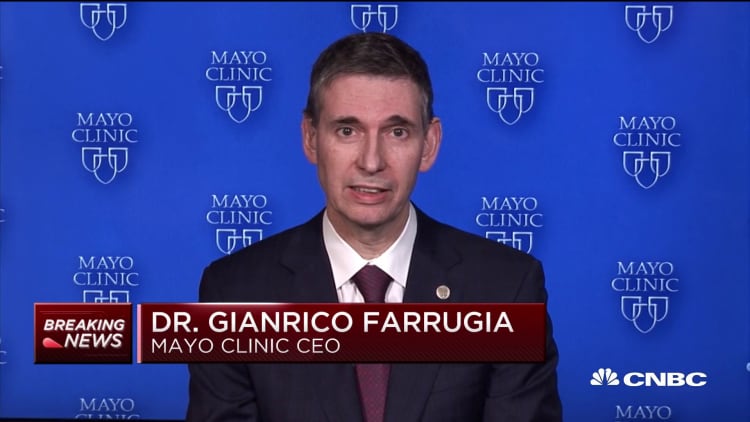Morgan Gleason, 21, has an autoimmune condition called juvenile dermatomyositis, which causes her body's immune system to attack its own cells and tissues.
She's been taking a medication called hydroxychloroquine, sold under the brand name Plaquenil, for eight years now. It helps her avoid "flareups," she says, which often start with muscle weakness, making it difficult for her to raise her arms above her head to brush her hair. From there, she'll quickly deteriorate to the point where she'll feel pain trying to use her hands for basic tasks, including her schoolwork.
Hydroxychloroquine is an antimalarial drug that is also commonly used to treat a wide range of autoimmune ailments, including lupus and conditions such as juvenile dermatomyositis.
But now supplies are running low across the country for patients such as Gleason who rely on the drug. As President Donald Trump has repeatedly and aggressively touted the drug as a potential cure for the novel coronavirus, hydroxychloroquine has been flying off the shelves at pharmacies. Earlier in the month, autoimmune patients could find it at a pharmacy in the area, even if it meant calling up a handful. But as of this week, several doctors told CNBC there are widespread shortages across many states, and it's gotten challenging to find it anywhere.
Gleason describes the possibility that she won't be able to access the drug as "terrifying." She only has a few more days before she runs out. Her pharmacy, which she contacted last week, is completely out of the medication.
"Most of my patients up until Friday were able to get it just by calling around a lot," said Kenneth Kalunian, a rheumatologist at UC San Diego Health who treats patients with lupus, among other ailments. "But this week, so far they've been totally cut off."
The Johns Hopkins Lupus Center describes hydroxychloroquine as helping reduce flareups in some patients "as much as 50%," noting that some may be on the drug for the rest of their lives to help keep their symptoms at bay. Hydroxychloroquine is the most commonly prescribed medication for autoimmune conditions versus other antimalarials because it's generally believed to cause fewer side effects.
In recent weeks, Trump has said he believes the medication could be a "game changer" against the coronavirus. But White House advisor and leading infectious disease specialist Dr. Anthony Fauci has called for far more testing of the drug before patients with COVID-19 are urged to take it.
"The data are really just, at best, suggestive," Dr. Anthony Fauci, head of the National Institute of Allergy and Infectious Diseases, told CBS' "Face the Nation" on April 5. "There have been cases that show there may be an effect, and there are others to show there's no effect. So I think, in terms of science, I don't think we could definitively say it works."
But with all the anxiety about COVID-19, some pharmacists and doctors have said that healthy people are starting to request the drug just to keep it on hand. When that kind of stockpiling happens, it makes it particularly difficult for autoimmune patients such as Gleason to access the medication. Dr. James Wantuck, a co-founder and medical provider at telemedicine service Plushcare, says he's getting "daily requests" for hydroxychloroquine.
In light of the shortages, doctors treating autoimmune patients are pressing policymakers and drug manufacturers to increase the production as quickly as possible.
"I'm telling my patients to take the drug as long as they can, and to know that the patient groups, medical societies and their doctors are advocating for them," said Dr. Kalunian.
In the meantime, the data coming out of studies looking into hydroxychloroquine don't indicate it's a panacea as a treatment for COVID-19. There are anecdotes from doctors using it for their coronavirus patients, sometimes alongside other medications, but that doesn't prove that the drug should be used in a broader population. Thus far, the human trials have shown only mixed results.
"It's stressful," said Dr. Isabelle Amigues, a rheumatologist based in Denver, Colorado. "On the one hand, we understand that the government wants to give some hope. But you're taking a medication from a patient where we know it can help, and giving it to a patient where we don't know if it works."



